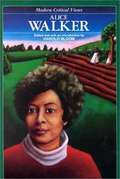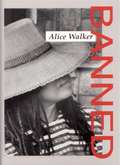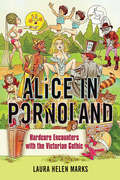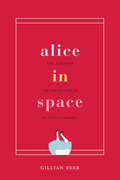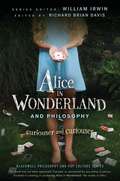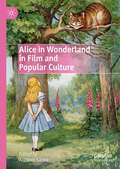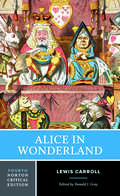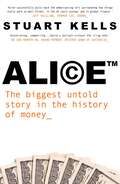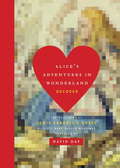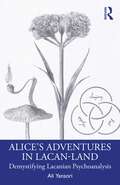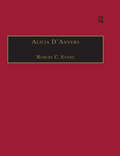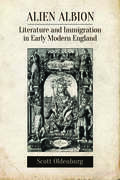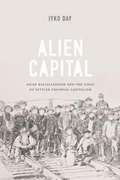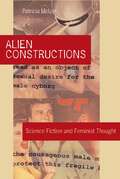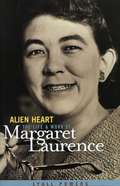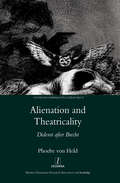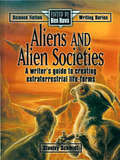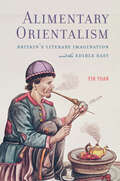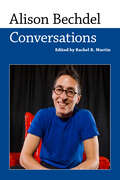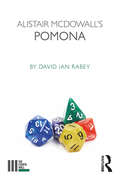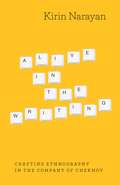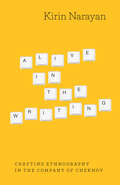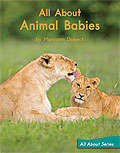- Table View
- List View
Alice Walker Banned
by Alice WalkerAlong with her Pulitzer Prize and American Book Award, Alice Walker has the honor of being one of the most censored writers in American literature. Like Mark Twain, John Steinbeck, Madeleine L'Engle and J.D. Salinger, Walker has been the subject of so much controversy that too often the artistry of her work has been lost in the politics of the moment. This small book presents two of Walker's most interesting stories, "Roselily" and "Am I Blue", and the beginning of her prize-winning novel, The Color Purple.
Alice in Pornoland: Hardcore Encounters with the Victorian Gothic (Feminist Media Studies #21)
by Laura Helen MarksThe unquenchable thirst of Dracula. The animal lust of Mr. Hyde. The acquiescence of Lewis Carroll's Alice. Victorian literature--with its overtones of prudishness, respectability, and Old World hypocrisy--belies a subverted eroticism. The Victorian Gothic is monstrous but restrained, repressed but perverse, static but transformative, and preoccupied by gender and sexuality in both regressive and progressive ways. Laura Helen Marks investigates the contradictions and seesawing gender dynamics in Victorian-inspired adult films and looks at why pornographers persist in drawing substance and meaning from the era's Gothic tales. She focuses on the particular Victorianness that pornography prefers, and the mythologies of the Victorian era that fuel today's pornographic fantasies. In turn, she exposes what porning the Victorians shows us about pornography as a genre. A bold foray into theory and other forbidden places, Alice in Pornoland reveals how modern-day Victorian Gothic pornography constantly emphasizes, navigates, transgresses, and renegotiates issues of gender, sexuality, and race.
Alice in Space: The Sideways Victorian World of Lewis Carroll (Carpenter Lectures)
by Gillian BeerIn Alice's Adventures in Wonderland and Through the Looking-Glass, Lewis Carroll created fantastic worlds that continue to delight and trouble readers of all ages today. Few consider, however, that Carroll conceived his Alice books during the 1860s, a moment of intense intellectual upheaval, as new scientific, linguistic, educational, and mathematical ideas flourished around him and far beyond. Alice in Space reveals the contexts within which the Alice books first lived, bringing back the zest to jokes lost over time and poignancy to hidden references. Gillian Beer explores Carroll's work through the speculative gaze of Alice, for whom no authority is unquestioned and everything can speak. Parody and Punch, evolutionary debates, philosophical dialogues, educational works for children, math and logic, manners and rituals, dream theory and childhood studies--all fueled the fireworks. While much has been written about Carroll's biography and his influence on children's literature, Beer convincingly shows him at play in the spaces of Victorian cultural and intellectual life, drawing on then-current controversies, reading prodigiously across many fields, and writing on multiple levels to please both children and adults in different ways. With a welcome combination of learning and lightness, Beer reminds us that Carroll's books are essentially about curiosity, its risks and pleasures. Along the way, Alice in Space shares Alice's exceptional ability to spark curiosity in us, too.
Alice in Wonderland and Philosophy: Curiouser and Curiouser
by Richard Brian DavisThe perfect companion to Lewis Carroll's classic book and director Tim Burton's March 2010 remake of Alice in Wonderland. Alice's Adventures in Wonderland has fascinated children and adults alike for generations. Why does Lewis Carroll introduce us to such oddities as blue caterpillars who smoke hookahs, cats whose grins remain after their heads have faded away, and a White Queen who lives backwards and remembers forwards? Is it all just nonsense? Was Carroll under the influence? This book probes the deeper underlying meaning in the Alice books, and reveals a world rich with philosophical life lessons. Tapping into some of the greatest philosophical minds that ever lived--Aristotle, Hume, Hobbes, and Nietzsche--Alice in Wonderland and Philosophy: explores life's ultimate questions through the eyes of perhaps the most endearing heroine in all of literature; looks at compelling issues such as perception and reality as well as how logic fares in a world of lunacy, the Mad Hatter, clocks, and temporal passage; offers new insights into favorite Alice in Wonderland characters and scenes, including the Mad Hatter and his tea party, the violent Queen of Hearts, and the grinning Cheshire Cat. Accessible and entertaining, Alice in Wonderland and Philosophy will enrich your experience of Alice's timeless adventures with new meaning and fun.
Alice in Wonderland in Film and Popular Culture
by Antonio SannaThis book examines the many reincarnations of Carroll’s texts, illuminating how the meaning of the original books has been re-negotiated through adaptations, appropriations, and transmediality. The volume is an edited collection of eighteen essays and is divided into three sections that examine the re-interpretations of Alice in Wonderland and Through the Looking-Glass in literature, film, and other media (including the branches of commerce, music videos, videogames, and madness studies). This collection is an addition to the existing work on Alice in Wonderland and its sequels, adaptations, and appropriations, and helps readers to have a more comprehensive view of the extent to which the Alice story world is vast and always growing.
Alice in Wonderland: A Norton Critical Edition (Norton Critical Editions #0)
by Lewis Carroll“Offering accurate texts, stimulating contexts, and a generous selection of essays to help readers make their way through Wonderland and Lewis Carroll’s other nonsense worlds, this remains the definitive critical edition of stories that remain as fresh and surprising now as they were when originally published more than 150 years ago.” —Robert Douglas-Fairhurst, University of Oxford “This new edition includes a rich array of Lewis Carroll’s marvelous writings, including personal letters and other important background material. A really splendid edition for teaching.” —Deborah Lutz, University of Louisville “Donald Gray’s fourth edition of Alice’s Adventures in Wonderland collects a fresh assortment of critical essays that will shed new light on the Alice books and The Hunting of the Snark. Organized around different periods in Charles Dodgson’s life, the backgrounds will enable students, scholars, and readers to place these beloved texts in their proper contexts. A crisp new edition.” —Ronjaunee Chatterjee, Queen’s University This Norton Critical Edition includes: The texts and original illustrations from the 1897 editions of Alice’s Adventures in Wonderland and Through the Looking-Glass as well as the 1878 edition of The Hunting of the Snark. Revised and updated footnotes, headnotes, and introductory materials by Donald J. Gray. Selections from Carroll’s diaries, letters, and other source materials examining three distinct periods in Carroll’s life and career. Fourteen critical interpretations—eight new to the Fourth Edition—ranging from contemporary perspectives to modern assessments. A selected bibliography. This purchase offers access to the digital ebook only.
Alice ™: The biggest untold story in the history of money
by Stuart KellsIn the 1980s and 90s, amid an explosion in international money flows, a handful of people saw a new financial future and staked claims in it, triggering a battle to control the world's money markets. With phenomenal profits at stake, the conflict would go all the way to the United States Supreme Court, in a case that involved not just the largest Wall Street banks against each other, but also the tech behemoths of Silicon Valley. The extraordinary story of Alice Corporation, a company created to reimagine financial markets, brings together an unlikely cast of characters: renowned author Kate Jennings, international banking insider Ian Shepherd, Enron CEO Jeffrey Skilling, German-born World War II historian Sigrid MacRae, J.P. Morgan deputy chair Roberto Mendoza - and his dog, Stanley. In the tradition of Michael Lewis's Flash Boys and The Big Short, Alice is a story of ground-breaking insights, legal intrigue and improbable friendships. Pinpointing the likely causes of the next financial crisis, Alice reveals the fight to build a safer, fairer financial future.
Alice's Adventures in Wonderland Decoded
by David DayThis gorgeous 150th anniversary edition of Alice's Adventures in Wonderland is also a revelatory work of scholarship. Alice's Adventures in Wonderland--published 150 years ago in 1865--is a book many of us love and feel we know well. But it turns out we have only scratched the surface. Scholar David Day has spent many years down the rabbit hole of this children's classic and has emerged with a revelatory new view of its contents. What we have here, he brilliantly and persuasively argues, is a complete classical education in coded form--Carroll's gift to his "wonder child" Alice Liddell. In two continuous commentaries, woven around the complete text of the novel for ease of cross-reference on every page, David Day reveals the many layers of teaching, concealed by manipulation of language, that are carried so lightly in the beguiling form of a fairy tale. These layers relate directly to Carroll's interest in philosophy, history, mathematics, classics, poetry, spiritualism and even to his love of music--both sacred and profane. His novel is a memory palace, given to Alice as the great gift of an education. It was delivered in coded form because in that age, it was a gift no girl would be permitted to receive in any other way. Day also shows how a large number of the characters in the book are based on real Victorians. Wonderland, he shows, is a veritable "Who's Who" of Oxford at the height of its power and influence in the Victorian Age. There is so much to be found behind the imaginary characters and creatures that inhabit the pages of Alice's Adventures in Wonderland. David Day's warm, witty and brilliantly insightful guide--beautifully designed and stunningly illustrated throughout in full colour--will make you marvel at the book as never before.From the Hardcover edition.
Alice’s Adventures in Lacan-Land: Demystifying Lacanian Psychoanalysis
by Ali YansoriAlice’s Adventures in Lacan-Land is an accessible exploration of Lacanian psychoanalysis through the prism of Lewis Carroll’s Alice’s Adventures in Wonderland and its sequel, Through the Looking-Glass.Bringing concepts of “reality”, “truth”, and “knowledge” under scrutiny, and assuming no prior knowledge of the original Alice books on the reader’s part, Ali Yansori looks at the treacherous nature of language. He addresses questions about identity formation, touching on concepts including the “Imaginary”, “alienation”, and the “ego”. Finally, the author considers the implications of Lacanian psychoanalysis for both the individual and society and critiques contemporary approaches to therapy, higher education, and other spheres of life.Alice’s Adventures in Lacan-Land will be an essential book for anyone encountering Lacan for the first time. It will also be of interest to more experienced readers seeking to engage with lesser-explored yet vital aspects of Lacanian theory.
Alicia D'Anvers: Printed Writings 1641–1700: Series II, Part Two, Volume 2 (The Early Modern Englishwoman: A Facsimile Library of Essential Works & Printed Writings, 1641-1700: Series II, Part Two #Pt. 2)
by Robert C. EvansBorn Alice Clarke, the daughter of Oxford university's 'first director of printing', Alicia D'Anvers' poetry demonstrates an intimate familiarity with Oxford and especially with the workings of the press. This volume reproduces three works: A Poem Upon His Sacred Majesty, His Voyage for Holland (1691), Academia: or, the Humours of the University of Oxford in Burlesque Verse (1691), and The Oxford-Act: A Poem (1693). A Poem Upon His Sacred Majesty... responds to William III's decision to visit his native Holland to negotiate with fellow Protestants about their conflict with Catholic France. William, often impatient with English political wrangling, sometimes hinted that he might abdicate and return to Holland. D'Anvers' poem reflects real anxieties about such an event, as well as solid support for the Protestant king. The copy reproduced in this edition is from the Houghton Library at Harvard University. Academia and The Oxford-Act concern more local matters. Probably D'Anvers' best poem, Academia satirises some of Oxford University's 'younger sort', often adopting language that seems as rough and coarse as that of the men that she mocks. The Oxford-Act focuses on the annual university 'Act' or commencement ceremony which lasted for several days and included many rituals. The copy reproduced here is from The Huntington Library. The copy of Academia is reproduced from that held at the Folger Shakespeare Library.
Alien Albion
by Scott OldenburgUsing both canonical and underappreciated texts, Alien Albion argues that early modern England was far less unified and xenophobic than literary critics have previously suggested. Juxtaposing literary texts from the period with legal, religious, and economic documents, Scott Oldenburg uncovers how immigrants to England forged ties with their English hosts and how those relationships were reflected in literature that imagined inclusive, multicultural communities.Through discussions of civic pageantry, the plays of dramatists including William Shakespeare, Thomas Dekker, and Thomas Middleton, the poetry of Anne Dowriche, and the prose of Thomas Deloney, Alien Albion challenges assumptions about the origins of English national identity and the importance of religious, class, and local identities in the early modern era.
Alien Capital: Asian Racialization and the Logic of Settler Colonial Capitalism
by Iyko DayIn Alien Capital Iyko Day retheorizes the history and logic of settler colonialism by examining its intersection with capitalism and the racialization of Asian immigrants to Canada and the United States. Day explores how the historical alignment of Asian bodies and labor with capital's abstract and negative dimensions became one of settler colonialism's foundational and defining features. This alignment allowed white settlers to gloss over and expunge their complicity with capitalist exploitation from their collective memory. Day reveals this process through an analysis of a diverse body of Asian North American literature and visual culture, including depictions of Chinese railroad labor in the 1880s, filmic and literary responses to Japanese internment in the 1940s, and more recent examinations of the relations between free trade, national borders, and migrant labor. In highlighting these artists' reworking and exposing of the economic modalities of Asian racialized labor, Day pushes beyond existing approaches to settler colonialism as a Native/settler binary to formulate it as a dynamic triangulation of Native, settler, and alien populations and positionalities.
Alien Constructions: Science Fiction and Feminist Thought
by Patricia MelzerThough set in other worlds populated by alien beings, science fiction is a site where humans can critique and re-imagine the paradigms that shape this world, from fundamentals such as the sex and gender of the body to global power relations among sexes, races, and nations. Feminist thinkers and writers are increasingly recognizing science fiction's potential to shatter patriarchal and heterosexual norms, while the creators of science fiction are bringing new depth and complexity to the genre by engaging with feminist theories and politics. This book maps the intersection of feminism and science fiction through close readings of science fiction literature by Octavia E. Butler, Richard Calder, and Melissa Scott and the movies The Matrix and the Alien series. Patricia Melzer analyzes how these authors and films represent debates and concepts in three areas of feminist thought: identity and difference, feminist critiques of science and technology, and the relationship among gender identity, body, and desire, including the new gender politics of queer desires, transgender, and intersexed bodies and identities. She demonstrates that key political elements shape these debates, including global capitalism and exploitative class relations within a growing international system; the impact of computer, industrial, and medical technologies on women's lives and reproductive rights; and posthuman embodiment as expressed through biotechnologies, the body/machine interface, and the commodification of desire. Melzer's investigation makes it clear that feminist writings and readings of science fiction are part of a feminist critique of existing power relations—and that the alien constructions (cyborgs, clones, androids, aliens, and hybrids) that populate postmodern science fiction are as potentially empowering as they are threatening.
Alien Constructions: Science Fiction and Feminist Thought
by Patricia MelzerThough set in other worlds populated by alien beings, science fiction is a site where humans can critique and re-imagine the paradigms that shape this world, from fundamentals such as the sex and gender of the body to global power relations among sexes, races, and nations. Feminist thinkers and writers are increasingly recognizing science fiction's potential to shatter patriarchal and heterosexual norms, while the creators of science fiction are bringing new depth and complexity to the genre by engaging with feminist theories and politics. This book maps the intersection of feminism and science fiction through close readings of science fiction literature by Octavia E. Butler, Richard Calder, and Melissa Scott and the movies The Matrix and the Alien series. Patricia Melzer analyzes how these authors and films represent debates and concepts in three areas of feminist thought: identity and difference, feminist critiques of science and technology, and the relationship among gender identity, body, and desire, including the new gender politics of queer desires, transgender, and intersexed bodies and identities. She demonstrates that key political elements shape these debates, including global capitalism and exploitative class relations within a growing international system; the impact of computer, industrial, and medical technologies on women's lives and reproductive rights; and posthuman embodiment as expressed through biotechnologies, the body/machine interface, and the commodification of desire. Melzer's investigation makes it clear that feminist writings and readings of science fiction are part of a feminist critique of existing power relations—and that the alien constructions (cyborgs, clones, androids, aliens, and hybrids) that populate postmodern science fiction are as potentially empowering as they are threatening.
Alien Heart: The Life and Work of Margaret Laurence
by Lyall PowersToday, almost two decades after her death, Margaret Laurence remains one of Canada's best-known and most beloved writers. Twice winner of the Governor General's Award for fiction, she was, as the late William French wrote, "more profoundly admired than any other Canadian novelist of her generation." Lyall Powers is both a respected scholar of literature and a lifelong friend of Laurence's, having met her when they were students together at Winnipeg's United College in the 1940s. Alien Heart is the first full-length biography of Margaret that combines personal knowledge and insights about Laurence with a study of her work, which often paralleled the events and concerns in her own life. Drawing on letters, personal correspondence, journals, and interviews, Lyall Powers discusses the struggles and triumphs Laurence experienced in her efforts to understand herself in the roles of writer, wife, mother, and public figure. He portrays a deeply compassionate and courageous woman, who yet felt troubled by conflicting demands. While Laurence's work is not directly autobiographical, Powers illustrates how her writing expressed many of the same dilemmas, and how the resolution her characters achieved in the novels and stories had an impact on Laurence's own life. Powers provides an in-depth analysis of all Laurence's work, including the early African essays, fiction, and translations, and her books for children, as well as the beloved Manawaka fiction. The study clearly shows the progression and expression of Laurence as a writer of great humanity and conscience.
Alienation and Theatricality: Diderot After Brecht
by Phoebevon HeldAlienation (Vefremdung) is a concept inextricably linked with the name of twentieth-century German playwright Bertolt Brecht - with modernism, the avant-garde and Marxist theory. However, as Phoebe von Held argues in this book, 'alienation' as a sociological and aesthetic notionavant la lettre had already surfaced in the thought of eighteenth-century French philosopher and writer Denis Diderot. This original study destabilizes the conventional understanding of alienation through a reading ofLe Paradoxe sur le comedien, Le Neveu de Rameau and other works by Diderot, opening up new ways of interpretation and aesthetic practices. If alienation constitutes a historical development for the Marxist Brecht, for Diderot it defines an existential condition. Brecht uses the alienation-effect to undermine a form of naturalism based on subjectivity, identification and illusion; Diderot, by contrast, plunges the spectator into identification and illusion, to produce an aesthetic of theatricality that is profoundly alienating and yet remains anchored in subjectivity.
Aliens & Alien Societies: A Writer's Guide to Creating Extraterrestrial Life-Forms (Science Fiction Writing Ser.)
by Schmidt Stanley"There are more things in heaven and earth, Horatio, than are dreamt of in your philosophy." - Hamlet, William ShakespeareStanley Schmidt guides you toward a better understanding of our universe to create beings who will live in your science fiction.Aliens and Alien Societies explains science to help you make your fiction plausible. You'll avoid bringing characters from solar systems unlikely to support life. Discover the galaxy's vastness and imagine the technology needed to cross it. Put biochemistry on your side to put viable creatures on your pages. Learn how engineering shapes life and why this suggests that intelligent inhabitants of other planets might have similarities to humans. Develop well-founded cultures and logical languages. Introduce aliens to people or other aliens. Portray them as individuals, true to their species.In this book, possibilities abound and lines between knowledge and conjecture blur enthrallingly.Aliens and Alien Societies is thoughtful, clear and utterly fascinating. It is filled with facts to help you write believable fictions about the things in heaven and earth.
Alimentary Orientalism: Britain’s Literary Imagination and the Edible East (Transits: Literature, Thought & Culture, 1650-1850)
by Yin YuanWhat, exactly, did tea, sugar, and opium mean in eighteenth- and nineteenth-century Britain? Alimentary Orientalism reassesses the politics of Orientalist representation by examining the contentious debates surrounding these exotic, recently popularized, and literally consumable things. It suggests that the interwoven discourses sparked by these commodities transformed the period’s literary Orientalism and created surprisingly self-reflexive ways through which British writers encountered and imagined cultural otherness. Tracing exotic ingestion as a motif across a range of authors and genres, this book considers how, why, and whither writers used scenes of eating, drinking, and smoking to diagnose and interrogate their own solipsistic constructions of the Orient. As national and cultural boundaries became increasingly porous, such self-reflexive inquiries into the nature and role of otherness provided an unexpected avenue for British imperial subjectivity to emerge and coalesce.
Alison Bechdel: Conversations (Conversations with Comic Artists Series)
by Rachel R. MartinDue to the huge success of her graphic memoir Fun Home: A Family Tragicomic in 2006 and its subsequent Tony Award–winning musical adaptation in 2009, Alison Bechdel (b. 1960) has recently become a household name. However, Bechdel, who has won numerous awards including a MacArthur Fellowship, has been writing and drawing comics since the early 1980s. Her comic strip Dykes to Watch Out For (DTWOF) stood out as one of the first to depict lesbians in popular culture and is widely hailed as an essential LGBTQ resource. It is also from this comic strip that the wildly popular Bechdel Test—a test to gauge positive female representation in film—obtained its name. While DTWOF secured Bechdel’s role in the comics world and queer community long before her mainstream success, Bechdel now experiences notoriety that few comics artists ever achieve and that women cartoonists have never attained.Spanning from 1990 to 2017, Alison Bechdel: Conversations collects twelve interviews that illustrate how Bechdel uses her own life, relationships, and contemporary events to expose the world to what she has referred to as the “fringes of acceptability”—the comics genre as well as queer culture and identity. These interviews reveal her intentionality in the use of characters, plots, structure, and cartooning to draw her readers toward disrupting the status quo.Starting with her earliest interviews on public access television and in little-known comics and queer presses, Rachel R. Martin traces Bechdel’s career from her days with DTWOF to her popularity with Fun Home and Are You My Mother? This volume includes her “one-off” DTWOF strips from November 2016 and March 2017 (not anthologized anywhere else) and in-depth discussions of her laborious creative process as well as upcoming projects.
Alistair McDowall's Pomona (The Fourth Wall)
by David Ian Rabey‘It’s all real. All of it. Everything bad is real’ - Moe Alistair McDowall’s Pomona was first staged in 2014 and won properly startling, and startled, acclaim. Its edgeland setting permits a surrealistic disengagement of linear forms of time, which is both dreamlike and wildly funny; nightmarish and ominously enveloping. The play has as its imaginative springboard a landscape which is both real and surreal. It offers an unforgettable journey into radical uncertainty, alongside unpredictable action that presents and questions the forms by which all too much of British life is lived. Rabey offers us a wild plunge into this modern English urban rabbit hole, a haunting and bewildering high-stakes hunt for meaning and value, set in a gothic noir Manchester, possibly dystopian (or possibly not).
Alive in the Writing: Crafting Ethnography in the Company of Chekhov
by Kirin NarayanAnton Chekhov is revered as a boldly innovative playwright and short story writer—but he wrote more than just plays and stories. In Alive in the Writing—an intriguing hybrid of writing guide, biography, and literary analysis—anthropologist and novelist Kirin Narayan introduces readers to some other sides of Chekhov: his pithy, witty observations on the writing process, his life as a writer through accounts by his friends, family, and lovers, and his venture into nonfiction through his book Sakhalin Island. By closely attending to the people who lived under the appalling conditions of the Russian penal colony on Sakhalin, Chekhov showed how empirical details combined with a literary flair can bring readers face to face with distant, different lives, enlarging a sense of human responsibility. Highlighting this balance of the empirical and the literary, Narayan calls on Chekhov to bring new energy to the writing of ethnography and creative nonfiction alike. Weaving together selections from writing by and about him with examples from other talented ethnographers and memoirists, she offers practical exercises and advice on topics such as story, theory, place, person, voice, and self. A new and lively exploration of ethnography, Alive in the Writing shows how the genre’s attentive, sustained connection with the lives of others can become a powerful tool for any writer.
Alive in the Writing: Crafting Ethnography in the Company of Chekhov
by Kirin NarayanAnton Chekhov is revered as a boldly innovative playwright and short story writer—but he wrote more than just plays and stories. In Alive in the Writing—an intriguing hybrid of writing guide, biography, and literary analysis—anthropologist and novelist Kirin Narayan introduces readers to some other sides of Chekhov: his pithy, witty observations on the writing process, his life as a writer through accounts by his friends, family, and lovers, and his venture into nonfiction through his book Sakhalin Island. By closely attending to the people who lived under the appalling conditions of the Russian penal colony on Sakhalin, Chekhov showed how empirical details combined with a literary flair can bring readers face to face with distant, different lives, enlarging a sense of human responsibility. Highlighting this balance of the empirical and the literary, Narayan calls on Chekhov to bring new energy to the writing of ethnography and creative nonfiction alike. Weaving together selections from writing by and about him with examples from other talented ethnographers and memoirists, she offers practical exercises and advice on topics such as story, theory, place, person, voice, and self. A new and lively exploration of ethnography, Alive in the Writing shows how the genre’s attentive, sustained connection with the lives of others can become a powerful tool for any writer.
All About Animal Babies (Fountas & Pinnell LLI Green #Level F, Lesson 88)
by Maryann DobeckFountas and Pinnell Leveled Literacy Intervention Green System -- 1st Grade
All About Astronauts
by Ginny GrissomThe fun and excitement of English and Language Arts learning continues in Grade 2 of Reading Street. This comprehensive and dynamic curriculum for homeschooling is geared toward young children who have some foundational English and Language Arts knowledge and are ready to strengthen their skills. Comprised of engaging activities, challenging content and weekly quizzes, Reading Street: Grade 2 is the next step in your child's path toward becoming a lifelong learner and reader. As with all Reading Street products, the Grade 2 system is formatted to help students meet certain age-appropriate goals. After completing this English and Language Arts homeschool program, your child should be able to: Read and comprehend two-syllable words. Identify common prefixes (such as pre-, un-, or re-) and suffixes (such as -able, -ad and -er). Correct mistakes made when reading out loud. Read books with two or more chapters. Understand the structure of stores (i. e. beginning, middle and end). Start selecting reading materials based on his/her own interests. Identify the "who," "what," "when," "where," "why" and "how" of the text. While the goals of second Grade English and Language Arts are numerous, Reading Street will help you craft engrossing lessons. Your child will garner important English and Language Arts skills while completing a workbook, reading stories and poems, and taking assessments. Planning these lessons will be easier than ever, as all Reading Street systems are broken down into weekly Big Ideas. All the work your child does on a given week is formulated around that single concept for an organized and challenging curriculum. With six easy-to-follow units, Reading Street: Grade 2 is the perfect tool for homeschooling parents. Your child will enjoy the reading selections and activities, and you'll love to see your student growing into a knowledgeable individual. We're confident that this product is the right one for you. For more information on the specific materials found in Grade 2 of Reading Street, check out the Features and Benefits page.
